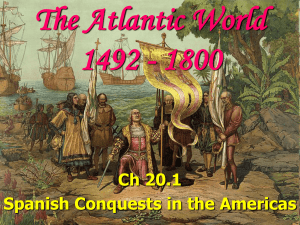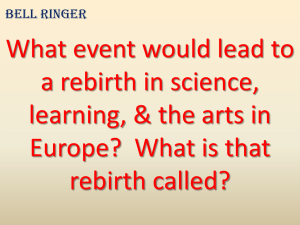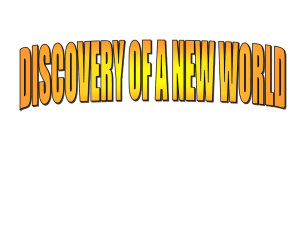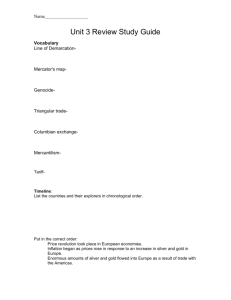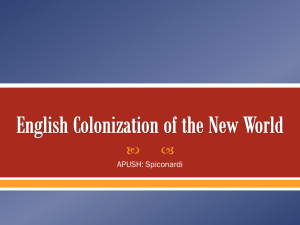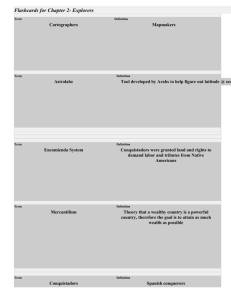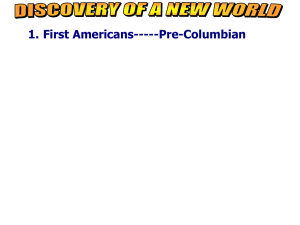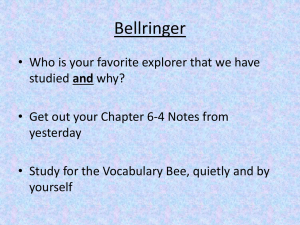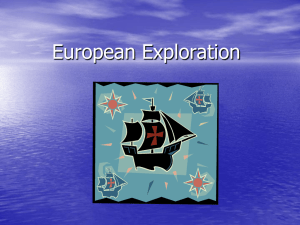File - Coach Sponsel's AP United States History
advertisement
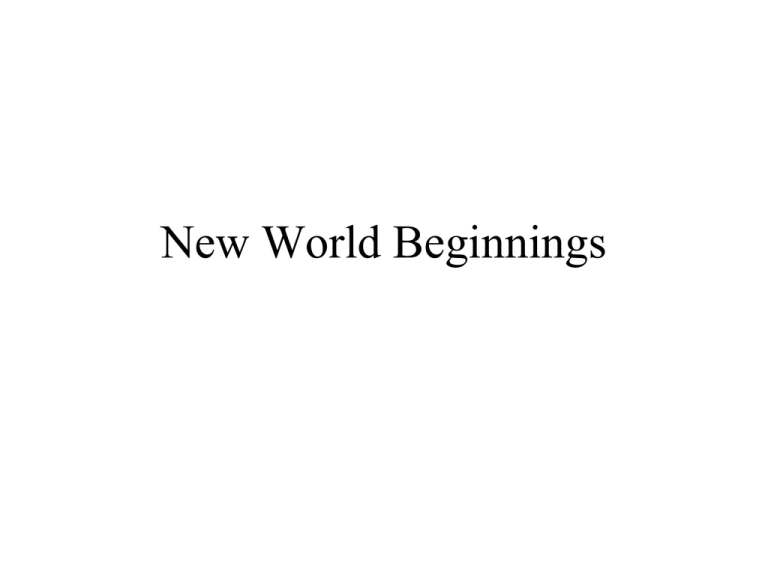
New World Beginnings Essential Questions 1. Who were the 1st inhabitants of the Americas? 2. How did the Europeans colonize the “New World”? •PreColumbian time period. •First Americans came from Asia •Crossed the Bering Strait during the Ice Age •Following a food source •Gradual migration How did these people adapted to their environments? Culture area Journal #1 • Tell me what you remember about the Renaissance. – What is the Importance of the Renaissance on American History? • Tell me what you remember about the Protestant Reformation. – What was the importance of the Protestant Reformation? • Tell me what you remember about trade routes to Asia throughout history. – What was the importance of Arab traders controlling the trade route to Asia? • Tell me what you remember about the rediscovery of the Americas. – What was the importance of Christopher Columbus rediscovering the “new world”? Earlier Explorations 1. Islam & the Spice Trade Silk Road 2. New Player Europe Expansion becomes a state enterprise monarchs had the authority & the resources. Better seaworthy ships. Motives for European Exploration 1. Crusades by-pass intermediaries to get to Asia. 2. Renaissance curiosity about other lands and peoples. 3. Reformation refugees & missionaries. 4. Monarchs seeking new sources of revenue. 5. Technological advances. 6. Fame and fortune. The Rebirth of Europe Economy Culture Politics Nations competed Ancient Greek, Roman,and Muslim for Asian trade. art and learning were rediscovered. Philosophy of Improved seahumanism: use of faring reason and technology aided exploration experimentation in learning and trade. Reformation: revolt against the Roman Catholic Church Spain & Portugal competed to explore trade routes. The rise of nations Michelangelo, Leonardo da Vinci Shakespeare Government by nobles and the Church declined. A time of rebirth in Western Civilization “intellectual enlightenment” New Weapons Technology Direct Causes = 3 G’s • Political: Become a world power through gaining wealth and land. (GLORY) • Economic: Search for new trade routes with direct access to Asian/African luxury goods would enrich individuals and their nations (GOLD) • Religious: spread Christianity and weaken Middle Eastern Muslims. (GOD) The 3 motives reinforce each other NEW WORLD OLD WORLD European explore EFFECTS •Europeans reach and settle Americas •Expanded knowledge of world geography •Growth of trade, mercantilism and capitalism •Indian conflicts over land and impact of disease on Indian populations •Introduction of the institution of slavery •Columbian Exchange WHITE EUROPEANS clash •Used the land for economic needs •Clearing the land, destroying hunting areas and fencing it off into private property •Divided the land and selling it for monetary value. NATIVE AMERICANS •Relationship with environment as part of their religion •Need to hunt for survival •Ownership meant access to the things the land produced, not ownership of the land itself. Columbian Exchange or the transfer of goods involved 3 continents, Americas, Europe and Africa * Squash * Turkey * Cocoa * Peanut * Avocado * Pumpkin * Pineapple * Tomato * Peppers * Tobacco * Cassava * Vanilla * Olive * Coffee Beans * Banana * Onion * Turnip * Honeybee * Grape * Peach * Sugar Cane * Citrus Fruits * Pear * Wheat * Cattle * Sheep * Pig * Flu * Typhus * Measles * Diptheria * Whooping Cough * Sweet Potatoes * Quinine * POTATO * MAIZE * Syphillis * Rice * Barley * Oats * HORSE * Smallpox * Malaria European Colonization European Colonization • the Big 4 four European countries begin competing for control of North America – Spain – England – France – Portugal • power struggle ultimately leads wars. • Spanish first to pursue colonization • Start in Caribbean, then Central and South Americ • First permanent colonies in what will become United States are founded by Spain – St. Augustine (Florida) is founded (1565) to protect Spanish treasure fleets Explorers Sailing For Spain • Columbus - Italian sailing for Spain Landed in the “West Indies” - 1492 • Magellan - Portuguese sailing for Spain - 1st to circumnavigate the world - 1522 Explorers Sailing From Hispaniola • De Leon - colonist of Hispaniola - Established colony at Puerto Rico - Sailed north looking for Fountain of Youth - Discovered Florida - 1508 • Balboa - colonist of Hispaniola - Established settlement in Panama - 1st European to see Pacific Ocean - 1513 • de Soto - Spain - Explored Florida into Carolina’s and west to the Mississippi River - 1541 Explorers Sailing For Spain & Portugal • Vespucci - Italian sailing for both Spain and Portugal - Sailed to the America’s Amerigo is his first name (where we get “America”) - 1501 Cycle of Conquest & Colonization Explorers European Colonial Empire Permanent Settlers The Colonial Class System Peninsulares Spanish ancestory Mestizos Spanish and Indian mixture Native Indians Creoles Mulattos White American and Black mixture Black Slaves Father Bartolomé de Las Casas •Believed Native Americans had been treated harshly by the Spanish. •Indians could be educated and converted to Christianity. •Believed Indian culture was advanced as European but in different ways. ► New Laws --> 1542 The Treaty of Tordesillas, 1434 & The Pope’s Line of Demarcation, 1493 • • • • European Motives in the New World (RECAP) Economic: to get Asian luxury items (spices, silk), gold, land Religious: to escape religious persecution (Anglicans, Catholics, Puritans, Separatists) and to Christianize the natives Some wanted to make a name for themselves by seeking adventure Some were forced (Africans)
